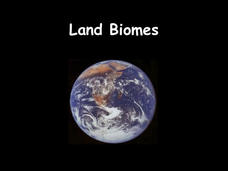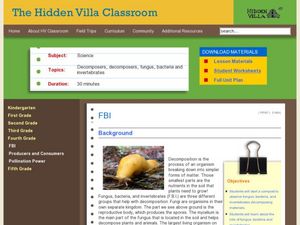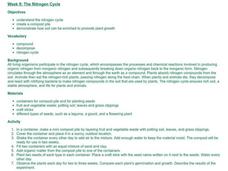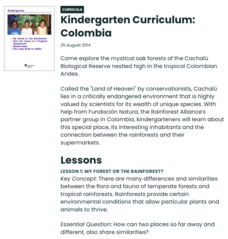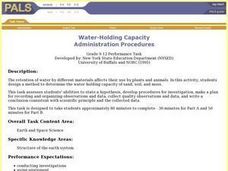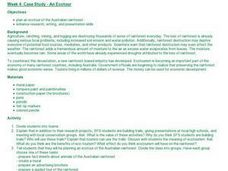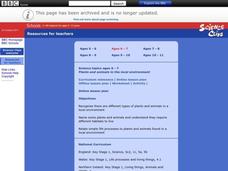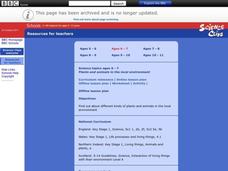Curated OER
Cows, Worms and Compost
Third graders explore agriculture by viewing a PowerPoint presentation in class. In this animal relationship lesson, 3rd graders identify the types of farm animals humans feed on and their dependency on such small insects like worms....
Curated OER
Optional Laboratory: Soil Particle Size and Texture
Young scholars work together to perform experiments on different types of soil. They record the soil's pH level, color and texture. They develop hypothesis' on what they believe they will discover before beginning the experiment.
Curated OER
Determine Soil Particle Size
Students examine various soil samples in groups. Using the samples, they identify the characteristics of them and calculate percolation and infiltration rates. They use this information to discover why some species can survive in one...
Curated OER
S-O-I-L Soil
Fifth graders research soil, its nutrients, and plant growth. In this soil lesson plan, 5th graders create soil journals, trace flowers, and include nutrient information on each petal. Students read an excerpt from "McBroom Tells the...
Curated OER
The Formation of Soil
Students identify the different components that make up soil. In this earth science instructional activity, students create a pamphlet for next year's class. They analyze how erosion and weathering shape the Earth.
Curated OER
Optional Laboratory: Comparing Soil Temperatures In Sun and Shade
Students work together to test the temperatures of different soils in shade and sun. They make their own hypothesis before beginning the experiment. They record their data and discuss as a class.
Curated OER
Soil Research
Third graders work together in groups to discover the importance of soils. Using a worksheet, they answer questions as they surf the internet. They observe three different types of soils and record their observations and use the internet...
Biology Junction
Land Biomes
Biomes share similar climates and ecosystems, despite being separated geographically on the planet. A presentation introduces the six most common land biomes. It focuses on the commonalities in climate, plants, and animals with many...
Curated OER
Be Kind to Mother Nature!
A clever instructional activity on identifying things that harm the environment is here for you. Elementary schoolers read a short paragraph describing the harm that can come to the environment due to human activities. Then, they must...
Curated OER
FBI
Fourth graders experiment with compost. In this Science lesson plan, 4th graders begin a worm compost as well as an outdoor compost. Students discuss decomposition.
Curated OER
Land Use Issues
Students examine soil types and determine the ability of each to absorb water. Working in groups, they time how long it takes for water to seep out the bottom of the cups. They examine soil components, conservation, erosion, and tree...
Curated OER
Prairie Scavenger Hunt
Here is a simple instructional activity for young learners on the plants, animals, and flowers found in the prairie environment. There are worksheets embedded in the plan that pupils use once a teacher-led discussion and demonstration...
Curated OER
The Nitrogen Cycle
Students design and create a compost pile in order to study the Nitrogen Cycle. They then use the scientific method to determine if plants grow better when they add organic matter from their compost pile to the plant's soil.
Curated OER
My Forest or the Rainforest?
Students explore the flora and fauna of temperate forests and rainforests. They examine the environmental conditions that allow certain plants and animals to live in the rainforest.
National Park Service
The Secret of Life
Dead trees provide nutrients for the soil, food for animals, protection and a home for organisms, a seed-bed for new trees, and a place for nitrogen-fixing bacteria to live. In the activity, pupils collect decaying logs, expose them to a...
Curated OER
Water-Holding Capacity
Students design and conduct an experiment to compare the water-holding capacity of sand, soil, and moss. They measure the change in weight for each material after adding the same amount of water to each material.
Curated OER
Dirt Life
Learners select and collect soil samples from a variety of locations (schoolyard, home, etc.). They do this lab after an interest-generating discussion about "dirt" and microbes. Students make a dilution in sterile water, plate it on a...
Curated OER
Case Study - An Ecotour
Young scholars plan an ecotour of the Australian rainforest. They prepare fact sheets about animals, create a mural, prepare a advertising brochure and a guided tour of the rainforest.
Curated OER
COMPARE SOILS BY GROWING PLANTS
The student will identify the difference in the rate of plant growth in three soils that vary in organic matter.1. Obtain three to four flowerpots, different types of soil, a record chart, three to five beans for each pot, and water....
Curated OER
Plants and Animals in the Local Environment
Students recognize the different types of plants and animals living in a local environment. They determine how they require different habitats to live, and relate simple life processes to plants and animals found in local environments.
Curated OER
Plants And Animals in the Local Environment
Pupils observe the various living things they can find outside their playground making sure to look both on the ground and in the air. They develop a large poster Venn digram, as a class, of plants and animals that live in the air, on...
Curated OER
Soil Factors
Eighth graders study the nine soil factors to use in field study and to complete an exam. They learn the components and characteristics of soil.
Curated OER
Science in the Garden
Students examine soil from their local environment. In this garden instructional activity, students recognize the importance of soil in the garden. Students explore the contents of the local soil.
Curated OER
Word Grid
In this soil activity, students find words that represent soil words in a word search. Students search for 9 words in this word search.









